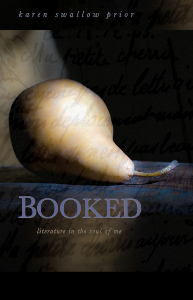I’ve never really wanted to read Jane Eyre. Until now.
 Jane Eyre is just one of several pieces of classic literature that Karen Swallow Prior, Professor of English at Liberty University, uses to chronicle her own journey of self-discovery — a journey of self-discovery through literature. In Booked: Literature in the Soul of Me, Madame Bovary, Tess of the D’Urbervilles, Great Expectations, Charlotte’s Web, and Gulliver’s Travels, are more than just musty old “classics” forced upon bored high-schoolers in hopes of igniting some semblance of cultural appreciation. They are signposts along the way of the author’s own pilgrimage. “Booked” is not just a celebration of great literature, but a window into how stories and the truths expressed through them, can intersect our lives and guide our growing.
Jane Eyre is just one of several pieces of classic literature that Karen Swallow Prior, Professor of English at Liberty University, uses to chronicle her own journey of self-discovery — a journey of self-discovery through literature. In Booked: Literature in the Soul of Me, Madame Bovary, Tess of the D’Urbervilles, Great Expectations, Charlotte’s Web, and Gulliver’s Travels, are more than just musty old “classics” forced upon bored high-schoolers in hopes of igniting some semblance of cultural appreciation. They are signposts along the way of the author’s own pilgrimage. “Booked” is not just a celebration of great literature, but a window into how stories and the truths expressed through them, can intersect our lives and guide our growing.
“Books have formed the soul of me. I know that spiritual formation is of God, but I also know—mainly because I learned it from books—that there are other kinds of formation, too, everyday gifts, and that God uses the things of this earth to teach us and shape us, and to help us find truth.”
To Karen Swallow Prior, those “everyday gifts… that God uses… to teach us and shape us, and to help us find truth,” are books.
Using Milton’s argument for “promiscuous reading” — imbibing a wide variety of authors, genres, opinions, subject matter, and stories — Prior sets the table for her own adventure into “literary promiscuity.” Thus, Milton’s Areopagitica, a speech given to counter a movement for censorship, becomes the framework for a more libertarian approach to reading. An approach that finds root in biblical literature.
“In making his argument, as a churchman to fellow churchmen, Milton cites the biblical examples of Moses, Daniel, and Paul, who were all steeped in the writings of their pagan cultures. Milton also invokes a leader of the third-century church who asserted that God commanded him in a vision, ‘read any books whatever come into your hands, for you are sufficient both to judge aright and to examine each matter.’ Such advice mirrors the Pauline suggestion to ‘test all things and hold fast to that which is good.'”
So because “falsehood prevails through the suppression of countering ideas, but truth triumphs in a free and open exchange that allows truth to shine,” the censorship of speech and the banning of books actually becomes a hindrance to the cause of Truth. (In light of evangelical culture’s censorial tendencies and allergy to anything “objectionable,” this is a much needed word!)
As such, each chapter is an insightful sketch of some piece of classic literature, intertwined with humorous, touching, often highly personal experiences from the author’s life. For example, using Gerard Manly Hopkins’ poem “Pied Beauty,” a poem that praises God for the variety of “dappled things” in nature — “All things counter, original, spare, strange; Whatever is fickle, freckled (who knows how?), With swift, slow; sweet, sour; adazzle, dim” — Prior tells the story of Gracie.
“We once had a Boxer of brindle color, rich, honeyed brown streaked with black. A birth defect resulted in the eventual removal of her deformed front leg. We named this awkward, three-legged creature Gracie. She was strong and muscular and loved to drink water right out of the spigot. I would caress the dimpled place where her leg used to be and think about how beautiful she was in her bold asymmetry. I loved her more than I have loved any animal in the world, and more than most people. we used to take her everywhere, and everyone else loved her, too. Often, after seeing Gracie run and play with as much passion and agility as any four-legged pup, people would begin to tell us stories of disability, sometime their own, sometimes someone else’s. they will tell of an accident, an illness, or war scene, all the while scratching Gracie’s ears or the scruff of her neck. they would tell of victory and overcoming and joy, too. When Gracie died from a tick borne disease when she was only six, we got a new dog right away to try to fill the hole she left in our lives, but I couldn’t stop crying for her for a year.”
I’ve had my own “dappled things” that came and went. Which is probably why I resonate with the author’s conclusion: “I’ve always lamented the particular poverty of children raised without pets.”
Like the classics, I found myself savoring “Booked,” reading it devotionally. Prior’s meditations reminded me of my own pilgrimage through life, and the books and authors who have accompanied me along the way. Whether it was Ray Bradbury, igniting my imagination with The Illustrated Man and October Country, Watership Down or The Book of the Dun Cow, Till We Have Faces, Godric, or Chesterton’s Orthodoxy, books have served as signposts, if not guideposts, “everyday gifts” that God used “to teach [me] and shape [me], and to help [me] find truth.”
Thus far, “Booked” is one of the best books I’ve read this year. Highly recommended to book lovers, promiscuous readers, and celebrants of “everyday gifts.”














